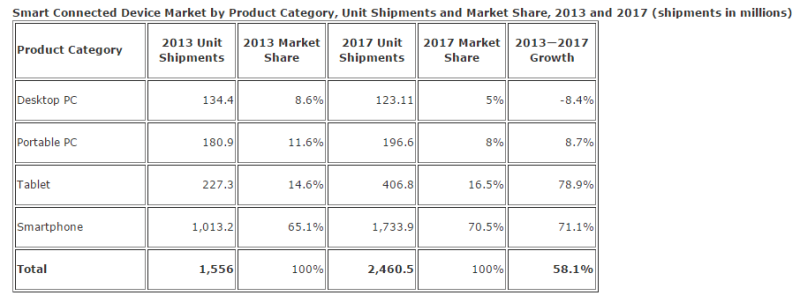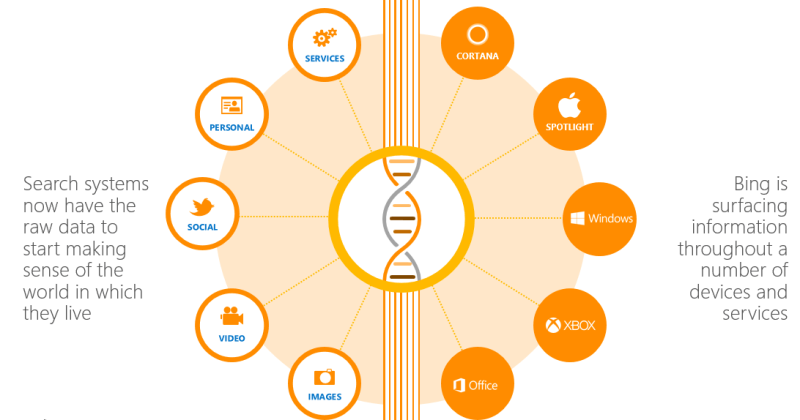The Future Of Search Is Productivity Across Platforms
Columnist John Cosley of Bing Ads discusses the future of search in a multi-device, cross-platform world.
Your life doesn’t fit in a box. Neither should your search. Search is evolving, which means finding what you need requires more than a search box and list of links.
Consumers aren’t just searching, they are seamlessly navigating between channels and devices. What’s more, evolving inputs like voice search are creating new scenarios; innovative user signals are building connections that bring in more personally relevant information.
All of these new search developments are enabled by the massive shift to mobile with smartphone adoption. Worldwide, IDC Mobile phone tracker reports that smartphones are outselling PCs 3:1, and they predict that this will grow to over 5:1 by 2017. The stage is set for massive disruption – search included.

Source: IDC Worldwide Quarterly Smart Connected Device Tracker, September 11, 2013
As smartphone penetration continues to grow, mobile devices are quickly becoming the primary avenue for advertisers to reach consumers.
According to Marin Software’s Mobile Search Advertising Around The Globe: 2014 Annual Report, mobile devices accounted for 34.2% of all paid search clicks in December 2013, and the report predicts that mobile devices will account for 50% of paid search clicks by the end of 2015.

Source: Marin Software
At Bing Ads, we’re experiencing similar momentum around this secular trend. The Yahoo Bing Network is seeing huge growth in mobile with 115% YOY increase in clicks last quarter. Mobile now represents one-third of all queries on the Yahoo Bing Network.
And mobile is just the beginning. Today, there’s an explosion of devices and data competing for our attention, but the time we have to spend on those devices and data remains finite.
Time is a zero sum game: search experiences are fragmented across so many devices and services, but constricted by a finite amount of time and attention (a fixed 24 hours in the day). People aren’t searching less, they are just searching differently — with mobile, watches, glasses, etc.
The Scarcity Of Time
Despite the explosion of devices and services, people are still looking to get their questions answered and tasks completed – they are just doing it in entirely new ways. The fundamental things people are doing are still the same, but ultimately they want to be able to do these tasks quickly and efficiently in order to maximize the limited time they have.
At Bing and Bing Ads, we believe to be successful long-term, search engines will need to provide real consumer value within this dynamic ecosystem.
Long-term search strategy must pivot around productivity and platforms — it’s about being relevant, and giving people back time by making their task completion more efficient (and successful). Being relevant will continue to allow search engines to monetize their vast audiences in various states of commercial intent.
Additionally, search engines will need to invest in unique assets — and weave those assets tightly together — across work and play to empower individuals to be more productive.
Search is a vehicle to help people complete tasks, be more productive across devices and services, and ultimately give people time back. Search is evolving into a platform – one that can be ever more accurate at understanding people’s intent. At the end of the day, search should exist to enable people to achieve more and do more.
Search As A Platform
Search engines, including Bing, now take in more and more information from a variety of data sources than ever before. Proliferation of devices — and the ability to track and digitize everything — has provided more information to digest.
This additional information helps connect people with intent to an action. It’s no longer just about finding a webpage. Today, “anticipatory search” (as seen with services like Cortana and Google Now) is providing information before a “search” even occurs.
Search engines will need to function as an information platform and an intelligent engine that supports task completion across devices and services, a concept far beyond simply crawling the worldwide web. This platform fabric must span across and power first- and third-party experiences.
For Bing, critical intelligence is realized through integration with Windows, Xbox, Cortana and Office — and for Google, its own ecosystem.
On partner devices, both Bing and Google are available across all platforms. This helps both companies achieve scale with mobile and better leverage the additional signals mobile devices can provide.
With Bing, for example, additional data richness is unlocked by powering different partner experiences, such as Spotlight on iOS 8 and web results on Siri.
Search engines need to use both the capabilities and the restrictions of devices to drive innovation (small screens, large screens, no screen, etc.). A search box is no longer sufficient or efficient for searches using a smartphone on-the-go, or even when sitting 10 feet away from a smart-TV.
We will all soon be seeing technologies that can understand user intent beyond just keyword queries: from voice, to gesture, to mixed modal dialogs, to touch.
Using different modalities and signals (voice, context, and location) augments search, maps to a better intent, and makes devices highly intelligent. This ultimately will mean that users will interact naturally with any family of devices and services.
Bing is innovating in natural user interfaces. We are helping consumers interact with the devices they use every day, and through these new search experiences, Bing is creating new insights for advertisers. For example, based on our research, we see voice search patterns to be quite different than text based. Voice searches are:
- More mobile
- More local (voice searches are 3x more likely to be local)
- More conversational
- Longer queries
- News oriented – sport scores, weather, etc.
What This Means For Advertisers
More signals and data to better understand intent will allow search providers to create a more efficient platform for advertisers.
At Bing Ads, we believe in the idea of building an “intent network” through the data we digest and the resulting intelligence about consumer behavior across devices and services. This philosophy allows us to provide the most value to our customers.
By providing a holistic view of searchers and a deeper understanding of user intent, Bing can help advertisers better target their audience. This idea allows us to think about how we leverage intelligence into more and better feed-based marketing (thinking beyond retail), new ad experiences, and more effective tools and services.
More data also creates more complexity, which can be difficult to manage. Tracking across devices, campaigns and channels is a big challenge. At Bing Ads, we are trying to solve this with Universal Event Tracking, a single site-wide tag that helps track users across different devices, campaigns and accounts for MSFT and Bing Ads campaigns.
And it all compounds to a single vision for advertisers: understanding people at the scale of one.
Contributing authors are invited to create content for Search Engine Land and are chosen for their expertise and contribution to the search community. Our contributors work under the oversight of the editorial staff and contributions are checked for quality and relevance to our readers. The opinions they express are their own.
Related stories
New on Search Engine Land


